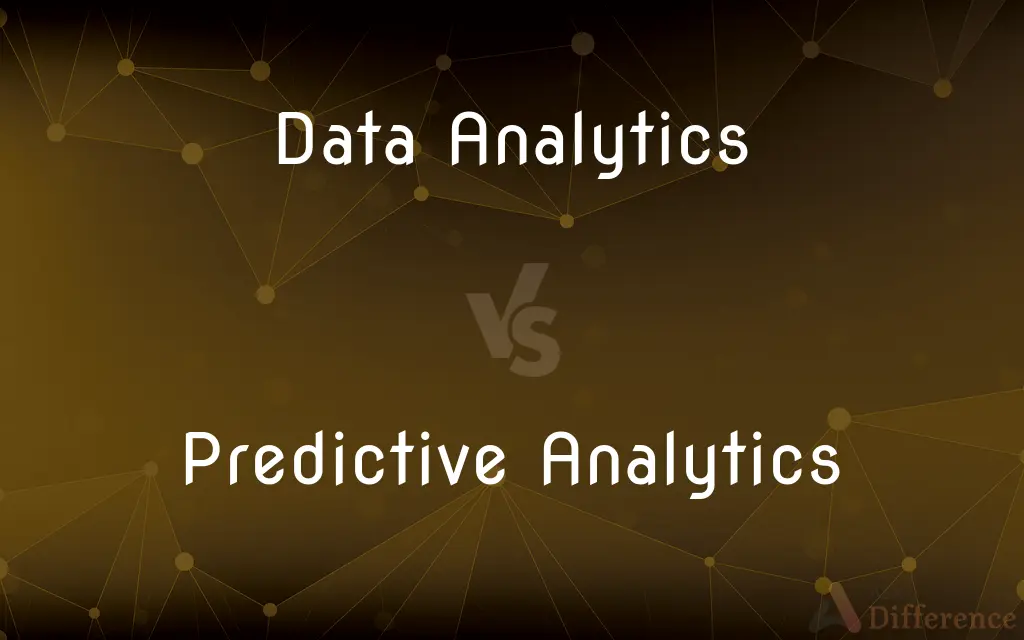Data Analytics vs. Predictive Analytics — What's the Difference?
Edited by Tayyaba Rehman — By Fiza Rafique — Published on January 6, 2024
Data Analytics involves analyzing raw data to find trends or insights, whereas Predictive Analytics uses statistical models to forecast future events.

Difference Between Data Analytics and Predictive Analytics
Table of Contents
ADVERTISEMENT
Key Differences
Data Analytics is a broad field that encompasses the process of examining datasets to conclude about the information they contain. It includes a variety of techniques with different goals, ranging from identifying patterns to optimizing processes. Predictive Analytics is a subset of data analytics focused specifically on making predictions about future events based on historical data. It applies statistical algorithms and machine learning techniques to data sets to create forecasts.
Data Analytics can be descriptive, diagnostic, or exploratory in nature. It often answers questions like "What happened?" and "Why did it happen?" by looking at historical data. Predictive Analytics, on the other hand, moves beyond this to answer "What could happen in the future?" It is more about probability and the likelihood of future outcomes based on current or historical data.
In Data Analytics, professionals may use a variety of tools and techniques to understand data, including data mining, data cleansing, and data visualization. These methods help organizations make informed decisions based on actual data but do not necessarily predict what will happen next. Predictive Analytics uses advanced analytics techniques, such as predictive modeling, to predict future events, which can be crucial for risk management, marketing, and strategic planning.
While Data Analytics can be applied to a one-time analysis or report, providing static insights, Predictive Analytics is often an ongoing process that continuously refines its forecasts as new data becomes available. It helps businesses to anticipate outcomes and behaviors so they can proactively take advantage of the predictions provided.
Lastly, the skill set required for Data Analytics might include data manipulation and visualization expertise, whereas Predictive Analytics often requires a deeper knowledge of statistical methods and machine learning algorithms, as well as a strong foundation in data analytics principles.
ADVERTISEMENT
Comparison Chart
Purpose
To understand patterns and insights from data
To forecast future events or trends
Type of Analysis
Descriptive, diagnostic, exploratory
Predictive, forward-looking
Data Utilization
Analyzes historical and current data
Uses data to make predictions
Techniques Used
Data mining, cleansing, visualization
Statistical modeling, machine learning
Business Application
Reporting, decision-making, operational
Forecasting, risk management, strategic planning
Compare with Definitions
Data Analytics
Data analytics refers to qualitative and quantitative techniques to enhance productivity.
Data analytics helped us reduce cost overruns in the production department.
Predictive Analytics
It’s the practice of extracting information from existing data sets to determine patterns.
With predictive analytics, the firm preemptively adjusted its strategies to avoid risk.
Data Analytics
Data Analytics is the science of analyzing raw data to make conclusions.
Using data analytics, the company improved its operational efficiency.
Predictive Analytics
It involves more than just analyzing existing data, but forecasting future probabilities.
Predictive analytics indicated a potential downturn in the market next quarter.
Data Analytics
Data analytics involves inspecting and modeling data to discover useful information.
Data analytics revealed the most profitable time of year for sales.
Predictive Analytics
It employs many techniques from data mining, statistics, and machine learning.
Predictive analytics was used to tailor marketing messages to individual preferences.
Data Analytics
It’s a process of transforming data into actionable insights for decision-making.
Through data analytics, we identified a new target market for our product.
Predictive Analytics
Predictive Analytics is the use of data, statistical algorithms to predict future outcomes.
Predictive analytics forecasted a spike in demand, prompting increased stock levels.
Data Analytics
It’s the systematic computational analysis of data or statistics.
Data analytics enabled the detection of fraud patterns in transactions.
Predictive Analytics
This type of analytics assesses the likelihood of future outcomes based on past data.
Predictive analytics suggested a high chance of churn for certain customer segments.
Common Curiosities
Why is Predictive Analytics important for forecasting?
Predictive Analytics is important for forecasting because it uses historical data to anticipate future conditions, aiding proactive decision-making.
How does Data Analytics help businesses?
Data Analytics helps businesses by providing insights into past performance, aiding in decision-making and strategic planning.
What is Predictive Analytics?
Predictive Analytics is the practice of using statistical analysis and models to predict future outcomes.
Which industries benefit from Data Analytics?
Nearly all industries, including healthcare, finance, and retail, benefit from Data Analytics.
Can Data Analytics predict future trends?
Data Analytics primarily focuses on analyzing past and current data to identify trends, not necessarily predicting future ones.
Which industries use Predictive Analytics?
Industries such as finance, insurance, marketing, and healthcare extensively use Predictive Analytics.
What is Data Analytics?
Data Analytics is the process of examining data sets to draw conclusions about the information they contain.
What skills are needed for Data Analytics?
Skills needed for Data Analytics include data visualization, statistical analysis, and data manipulation.
How do companies store data for Analytics?
Companies store data in databases, data warehouses, or data lakes that are designed to support analytics.
What is the main goal of Predictive Analytics?
The main goal of Predictive Analytics is to make informed predictions about future events or behaviors.
Does Data Analytics involve machine learning?
Data Analytics can involve machine learning, particularly in sophisticated, predictive, or prescriptive analyses.
What skills are crucial for Predictive Analytics?
Skills crucial for Predictive Analytics include knowledge of machine learning, statistical modeling, and data mining.
Is Predictive Analytics always accurate?
Predictive Analytics is not always accurate; predictions are based on probabilities and are as good as the data and models used.
Can Predictive Analytics inform business strategy?
Yes, Predictive Analytics can significantly inform business strategies by forecasting market trends and customer behavior.
What’s the difference between Data Analytics and Data Science?
Data Analytics refers specifically to the analysis and findings from data, while Data Science encompasses the entire spectrum of data gathering, cleaning, analysis, and modeling.
Share Your Discovery

Previous Comparison
Alpha Hemolysis vs. Beta HemolysisAuthor Spotlight
Written by
Fiza RafiqueFiza Rafique is a skilled content writer at AskDifference.com, where she meticulously refines and enhances written pieces. Drawing from her vast editorial expertise, Fiza ensures clarity, accuracy, and precision in every article. Passionate about language, she continually seeks to elevate the quality of content for readers worldwide.
Edited by
Tayyaba RehmanTayyaba Rehman is a distinguished writer, currently serving as a primary contributor to askdifference.com. As a researcher in semantics and etymology, Tayyaba's passion for the complexity of languages and their distinctions has found a perfect home on the platform. Tayyaba delves into the intricacies of language, distinguishing between commonly confused words and phrases, thereby providing clarity for readers worldwide.













































